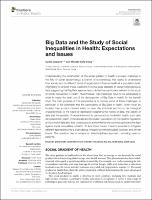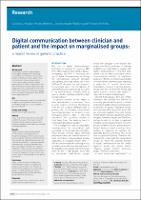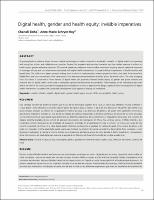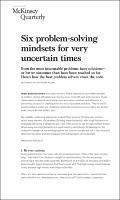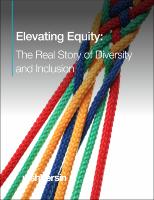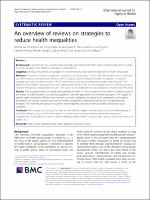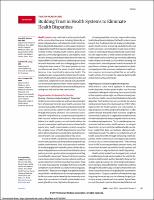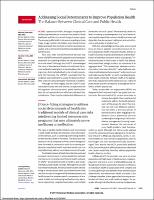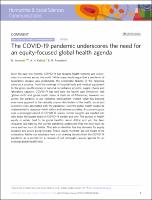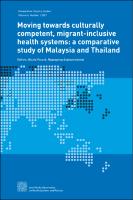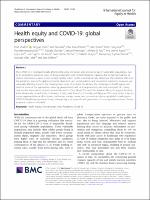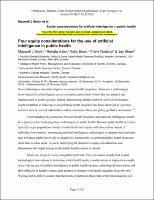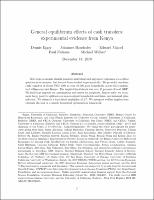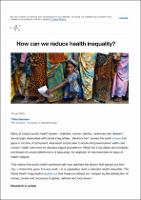1.02 Policies & Actions
Collections in this community
Recent Submissions
Big Data and the Study of Social Inequalities in Health: Expectations and Issues
(Frontiers in Public Health, 2018-10-26)
Understanding the construction of the social gradient in health is a major challenge in
the field of social epidemiology, a branch of epidemiology that seeks to understand
how society and its different forms of organization influence health at a population level.
Attempting to answer these questions involves large datasets of varied heterogeneous
data suggesting that Big Data approaches could be then particularly relevant to the study
of social inequalities in health. Nevertheless, real challenges have to be addressed in
order to make the...
Digital communication between clinician and patient and the impact on marginalised groups: a realist review in general practice
(British Journal of General Practice, 2015-12)
Background Increasingly, the NHS is embracing the use of digital communication technology for communication between clinicians and patients. Policymakers deem digital clinical communication as presenting a solution to the capacity issues currently faced by general practice. There is some concern that these technologies may exacerbate existing inequalities in accessing health care. It is not known what impact they may have on groups who are already marginalised in their ability to access general practice. Aim To assess the potential impact of th...
Digital health, gender and health equity: invisible imperatives
(Journal of Public Health, 2018-12-01)
A growing body of evidence shows the use of digital technologies in health—referred to as eHealth, mHealth or ‘digital health’—is improving and saving lives in low- and middle-income countries. Despite this prevalent and persistent narrative, very few studies examine its effects on health equity, gender and power dynamics. This journal supplement addresses these invisible imperatives by going beyond traditional measures of coverage, efficacy and cost-effectiveness associated with digital health interventions, to unpack different experiences of h...
Six problem-solving mindsets for very uncertain times
(McKinsey Quarterly, 2020-09)
Systems Change Framework
(The Australian Prevention Partnership Centre and the Tasmanian Department of Health, 2018)
Embracing complexity Towards a shared understanding of funding systems change
(2020-01)
The report is the result of collaboration between Ashoka and McKinsey & Company, as well as social entrepreneurs from Catalyst 2030, Co-Impact, Echoing Green, Schwab and Skoll and SystemIQ.
How can systems change across the world be financed more effectively? How can change be better supported for the benefit of society? “Embracing complexity – Towards a shared understanding of funding systems change” provides donors and investors, as well as charitable initiatives and organizations, with answers to these questions. A clearly defined vision...
An overview of reviews on strategies to reduce health inequalities
(2020-12)
Background: Governments are incentivized to develop and implement health action programs focused on equity to ensure progress with effective strategies or interventions. Objective: Identify and synthesize strategies or interventions that facilitate the reduction of health inequalities. Methods: A systematic search strategy was carried out up until August 2019 in MEDLINE (Ovid), Embase (Elsevier), Cochrane Database of Systematic Reviews, LILACS, Scopus, Scielo and Epistemonikos. In addition, a snowball strategy was used. Literature reviews (LRs)...
Changing Systems, Power & Potential
(2020-03)
Mark Cabaj, President of the Canadian consulting company From Here to There and an Associate of Tamarack – An Institute for Community Engagement, worked with CFI to deliver a two-day workshop in March 2020 on Changing Systems, Power and Potential.
CFI Network member Fiona McKenzie observed and synthesised the learnings, discussions and perspectives into a report which captures contributions from both presenters and participants.
The result is a blend of concepts, frameworks, applications, hints and common threads that emerged about efforts to...
Building Trust in Health Systems to Eliminate Health Disparities
(JAMA, 2019-07-09)
The COVID-19 pandemic underscores the need for an equity-focused global health agenda
(2021-12)
Over the past few months, COVID-19 has ravaged health systems and economies in countries across the world. While many would argue that a pandemic of respiratory disease was predictable, the systematic failures of the response came as a surprise. From the shortage of hospital beds and medical equipment to the gross insufficiencies in national surveillance systems, supply chains and laboratory capacity, COVID-19 has laid bare the health care limitations that ‘global north’ and ‘global south’ share. A stark set of differences, however, run across ...
Moving towards culturally competent, migrant-inclusive health systems: a comparative study of Malaysia and Thailand
(the Asia Pacific Observatory on Health Systems and Policies, 2021)
Migrants are seldom included in policy discussions on the provision of health care, and in country policy reforms towards health for all. In addition, evidence on health care for migrant populations to inform and guide policy makers is limited. This Comparative Country Study (CCS) uses mixed-method approaches to analyse the extent to which two middle-income countries – Thailand and Malaysia, have culturally competent, migrant-inclusive health systems. The countries have taken different approaches to developing a migrant-inclusive health system....
Health equity and COVID-19: global perspectives
(2020-12)
The COVID-19 is disproportionally affecting the poor, minorities and a broad range of vulnerable populations, due to its inequitable spread in areas of dense population and limited mitigation capacity due to high prevalence of chronic conditions or poor access to high quality public health and medical care. Moreover, the collateral effects of the pandemic due to the global economic downturn, and social isolation and movement restriction measures, are unequally affecting those in the lowest power strata of societies. To address the challenges to...
General Equilibrium Effects of Cash Transfers: Experimental Evidence from Kenya
(National Bureau of Economic Research, 2019-12)
How large economic stimuli generate individual and aggregate responses is a central question in economics, but has not been studied experimentally. We provided one-time cash transfers of about USD 1000 to over 10,500 poor households across 653 randomized villages in rural Kenya. The implied fiscal shock was over 15 percent of local GDP. We find large impacts on consumption and assets for recipients. Importantly, we document large positive spillovers on non-recipient households and firms, and minimal price inflation. We estimate a local fiscal multip...
How can we reduce health inequality?
(2015-01-19)
Equity, Diversity & Inclusion: A resource guide for Leaders in Collegiate Recreation
(NIRSA Commission on Equity, Diversity & Inclusion, 2019-02)
The publication, Equity, Diversity & Inclusion: A resource guide for Leaders in Collegiate Recreation, compiles foundational concepts, research-driven best practices, and case studies to help campus recreation professionals develop competencies around EDI – for their own personal and professional growth, as well as for their departments. The publication includes the following:
Introduction to equity, diversity, and inclusion and the NIRSA EDI Identity Wheel.
Definitions for a broad range of terminology associated with the nine identities focus...


